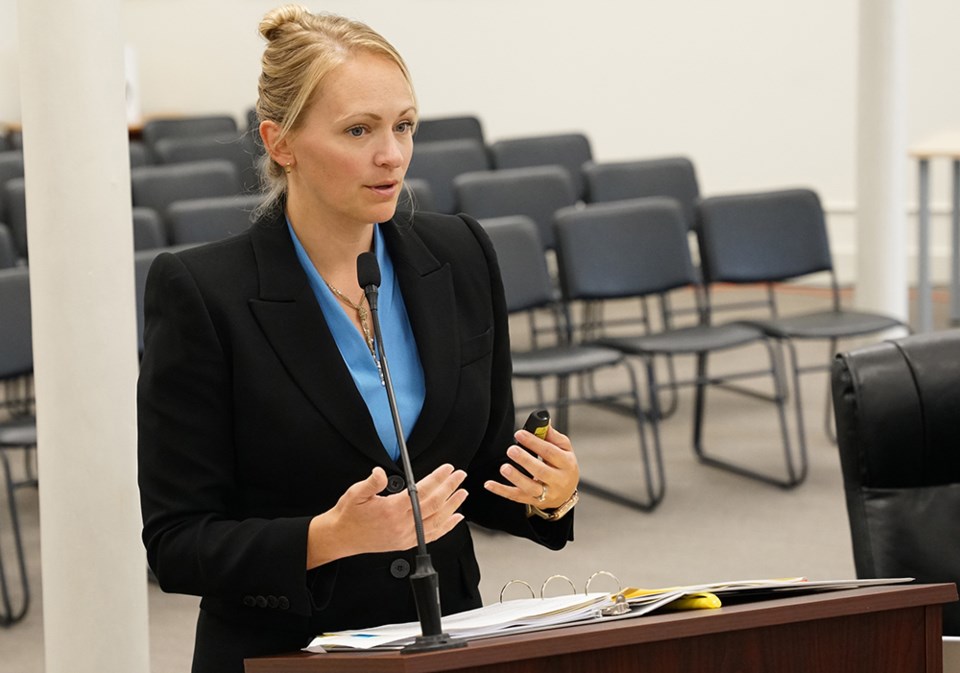City of Powell River’s budgeting process for the 2024 to 2028 five-year financial plan is underway.
At the August 25 special council meeting, chief financial officer Mallory Denniston introduced a timeline, with some alterations to how the budgeting process has occurred in the past.
“I’m looking for direction on this timeline to ensure that this is council’s budget and as we proceed, we are proceeding with how council would like to execute the budget this year,” said Denniston. “By background, the Community Charter does require the city to adopt a five-year financial plan bylaw annually before May 15 and that must occur before the annual property tax rate bylaw.
“Until the 2024 financial plan is adopted, the 2023 financial plan is in effect.”
Denniston said the first step in the budgeting process is to establish a timeline. She said the end of August is a great time to have an open discussion about what council wants the coming months to look like.
“Based on how the prior year budget went, and feedback I’ve received, I’ve taken a first stab at a tax timeline. To summarize, it starts in August and would end on May 2, 2024.”
Denniston said there are three main phases to the budget process. The first is August to October, which is the council direction and community engagement phase, she said.
“Here is where we put up front the request from council to staff, understanding the strategic priorities, engaging the public and understanding their requests and their ideas,” said Denniston.
She said in November and December, the first and second financial plan drafts will be introduced.
“That’s where we can put something on the floor,” said Denniston. “On November 2 we’ll have the directors present their budgets and then council would give feedback. Then, there would be about a month to turn around draft two.”
Denniston said the final phase is January to May, where staff start bringing the bylaws in front of council for consideration and adoption. It’s also when the city receives the BC Assessment property tax roll, so assessment changes can be looked at, she said.
This year, the plan is to engage the public sooner than in the past. Denniston’s plan features opening the online engagement in September rather than the end of the year, which has been typical in previous years. As well, there’s a September 28 in-person engagement planned, similar to the budget open house that was conducted in March of this year.
“It was well attended and received a lot of good feedback,” said Denniston. “I recall some of the feedback being could we do this earlier in the process, so we can incorporate the input, rather than educating on what the budget is.”
Denniston said her recommendation is that the 2024 to 2028 financial plan and 2024 property tax timeline be approved.
Councillor questions
Councillor Trina Isakson, who chairs the finance committee, said in previous years, council has received some direction about assumptions, and she didn’t think that Denniston had asked for that for this budget.
“Particularly related to assumptions regarding service levels and whether those will be maintained, are you looking for that direction today?” asked Isakson.
Denniston said given some uncertainties, that will be discussed later in the process.
Isakson said the in-person engagement might provide insight on what council would direct staff to do based on what the public is interested in.
Councillor George Doubt said regarding the online engagement in September, for taxpayers to provide valid input, they don’t have guidance from council about what council thinks may be the direction to go on service levels, and the direction to go on a percentage tax increase target.
“Knowing those would provide valuable information for taxpayers trying to participate online,” said Doubt. “The service levels and the target tax rates have to be somewhat firm for the directors to provide meaningful information when they come before council to talk about how much they want to spend in their different budgets. Is there any hope of getting more clarity on those dates?”
Denniston said there are pros and cons to the early public engagement. She said the online engagement called the Balancing Act will use the 2023 budget and residents will be asked to dial up or down for the departments.
“We’re not asking them to set 2024 necessarily,” said Denniston. “We’ll ask, reflecting on 2023, what changes do you want?”
Doubt said his preferred target would be to have as much information as can be possibly provided to the electorate about where council would like to go.
He said in previous years, council has set a target for service levels and a target range of tax increases quite early, in August or early September.
“I would like to see that done as soon as possible to inform the online Balancing Act,” said Doubt. “They can do it way better if they have council’s general parameters set before they start consulting. The later we leave decisions in the process, the less time there is to do consulting.”
Council voted unanimously to approve the five-year financial plan and property tax timeline.
Join the Peak's email list for the top headline right in your inbox Monday to Friday: prpeak.com/account/mailinglist.



